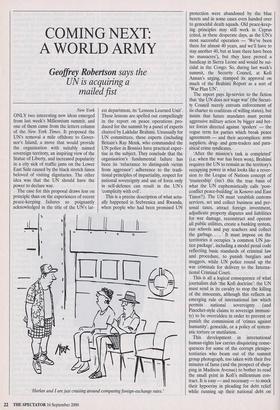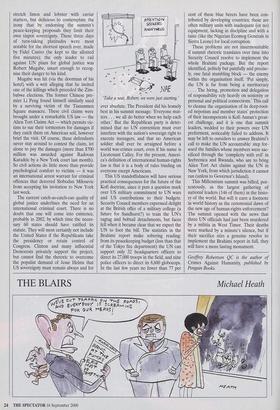COMING NEXT: A WORLD ARMY
Geoffrey Robertson says the
UN is acquiring a mailed fist
New York ONLY two interesting new ideas emerged from last week's Millennium summit, and one of them came from the letters column of the New York Times. It proposed the UN's removal a mile offshore to Gover- nor's Island, a move that would provide the organisation with suitably named sovereign territory, an inspiring view of the Statue of Liberty, and increased popularity in a city sick of traffic jams on the Lower East Side caused by the black stretch limos beloved of visiting dignitaries. The other idea was that the UN should have the power to declare war.
The case for this proposal draws less on principle than on the experiences of recent peace-keeping failures so poignantly acknowledged in the title of the UN's lat- est department, its 'Lessons Learned Unit'. These lessons are spelled out compellingly in the report on peace operations pro- duced for the summit by a panel of experts chaired by Lakhdar Brahimi. Unusually for UN committees, these experts (including Britain's Ray Monk, who commanded the UN police in Bosnia) have practical exper- tise in the subject. They conclude that the organisation's fundamental failure has been its 'reluctance to distinguish victim from aggressor': adherence to the tradi- tional principles of impartiality, respect for national sovereignty and use of force only in self-defence can result in the UN's `complicity with evil'.
This is a precise description of what actu- ally happened in Srebrenica and Rwanda, when people who had been promised UN `Harlan and I are just cruising around comparing foreign-exchange rates.' protection were abandoned by the blue berets and in some cases even handed over to genocidal death squads. Old peace-keep- ing principles may still work in Cyprus (cited, in these desperate days, as the UN's most successful operation — 'We've been there for almost 40 years, and we'll have to stay another 40, but at least there have been no massacres'), but they have proved a handicap in Sierra Leone and would be sui- cidal in the Congo. So, during last week's summit, the Security Council, at Kofi Adman's urging, stamped its approval on much of the Brahimi Report as a sort of `War Plan UN'.
The report pays lip-service to the fiction that 'the UN does not wage war' (the Securi- ty Council merely entrusts enforcement of its charter to coalitions of willing states), but insists that future mandates must permit aggressive military action by bigger and bet- ter forces directed against 'spoilers' — the vogue term for parties which break peace agreements — and their accomplices: arms suppliers, drug- and gem-traders and para- sitical crime syndicates.
`After the mission's task is completed' (i.e. when the war has been won), Brahimi requires the UN to remain as the territory's occupying power in what looks like a rever- sion to the League of Nations concept of `trusteeship' (isn't this the true basis of what the UN euphemistically calls 'post- conflict peace-building' in Kosovo and East Timor?). The UN must 'establish customs services, set and collect business and per- sonal taxes, attract foreign investment, adjudicate property disputes and liabilities for war damage, reconstruct and operate all public utilities, create a banking system, run schools and pay teachers and collect the garbage. . ' It must impose on the territories it occupies 'a common UN jus- tice package', including a model penal code reflecting basic standards of criminal law and procedure, to punish burglars and muggers, while UN police round up the war criminals for delivery to the Interna- tional Criminal Court.
This is all a logical consequence of what journalists dub 'the Kofi doctrine': the UN must send in its cavalry to stop the killing of the innocents, although this reflects an emerging rule of international law which permits national sovereignty (and Pinochet-style claims to sovereign immuni- ty) to be overridden in order to prevent or punish the commission of 'crimes against humanity', genocide, or a policy of system- atic torture or mutilation.
This development in international human-rights law carries disquieting conse- quences for some of the corrupt plenipo- tentiaries who beam out of the summit group photograph, too taken with their five minutes of fame (and the prospect of shop- ping in Madison Avenue) to bother to read the small print in Kofi's millennium con- tract. It is easy — and necessary — to mock their hypocrisy in pleading for debt relief while running up their national debt on stretch limos and lobster with caviar starters, but delicious to contemplate the irony that by endorsing the summit's peace-keeping proposals they limit their own tinpot sovereignty. These three days of turn-taking platitudes were most notable for the shortest speech ever, made by Fidel Castro (he kept to the allotted five minutes); the only leader to rail against UN plans for global justice was Robert Mugabe, smart enough to recog- nise their danger to his kind.
Mugabe was hit (via the doorman of his hotel) with a writ alleging that he incited one of the killings which preceded the Zim- babwe elections. The former Chinese pre- mier Li Peng found himself similarly sued by a surviving victim of the Tiananmen Square massacre. These civil claims were brought under a remarkable US law — the Alien Tort Claims Act — which permits vic- tims to sue their tormentors for damages if they catch them on American soil, however brief the visit. Of course, these defendants never stay around to contest the claim, let alone to pay the damages (more than $700 million was awarded against Radovan Karadzic by a New York court last month). So civil actions do little more than provide psychological comfort to victims — it was an international arrest warrant for criminal offences that deterred Slobodan Milosevic from accepting his invitation to New York last week.
The current catch-as-catch-can quality of global justice underlines the need for an international criminal court. There is no doubt that one will come into existence, probably in 2002, by which time the neces- sary 60 states should have ratified its statute. They will most certainly not include the United States if the Republicans take the presidency or retain control of Congress. Clinton and many influential Democrats privately support the project, but cannot fmd the rhetoric to overcome the populist demand of Jesse Helms that US sovereignty must remain always and for `Take a seat, Robert, we were just starting.'
ever absolute. The President did his homely best in his summit message: 'Everyone mat- ters . . . we all do better when we help each other.' But the Republican party is deter- mined that no UN convention must ever interfere with the nation's sovereign right to execute teenagers, and that no American soldier shall ever be arraigned before a world war-crimes court, even if his name is Lieutenant Caney. For the present, Ameri- ca's definition of international human-rights law is that it is a body of rules binding on everyone except Americans.
This US standoffishness will have serious practical consequences for the future of the Kofi doctrine, since it puts a question mark over US military commitment to UN wars and US contributions to their budgets. Security Council members expressed delight at the British offer of a military college (a future for Sandhurst?) to train the UN's ragtag and bobtail detachments, but faces fell when it became clear that we expect the UN to foot the bill. The statistics in the Brahimi report make sobering reading: from its peacekeeping budget (less than that of the Tokyo fire department) the UN can support only 32 headquarters officers to direct its 27,000 troops in the field, and nine police officers to direct its 8,600 globocops. In the last few years no fewer than 77 per cent of these blue berets have been con- tributed by developing countries; these are often military units with inadequate (or no) equipment, lacking in discipline and with a taste (like the Nigerian Ecomog Generals in Sierra Leone) for local corruption.
These problems are not insurmountable if summit rhetoric translates over time into Security Council resolve to implement the whole Brahimi package. But the report identified, politely but painfully and precise- ly, one fatal stumbling block — the enemy within the organisation itself. 'Put simply, the UN is far from being a meritocracy . . . . The hiring, promotion and delegation of responsibility rely heavily on seniority or personal and political connections.' This call to cleanse the organisation of its deep-root- ed nepotism and member states' protection of their incompetents is Kofi Annan's great- est challenge, and it is one that summit leaders, wedded to their powers over UN preferment, noticeably failed to address. It may be left to outsiders to answer Brahimi's call to make the UN accountable: step for- ward the families whose members were sac- rificed through the 'complicity with evil' in Srebrenica and Rwanda, who are to bring Alien Tort Act claims against the UN in New York, from which jurisdiction it cannot run (unless to Governor's Island).
This Millennium summit was billed, por- tentously, as the largest gathering of national leaders (146 of them) in the histo- ry of the world. But will it earn a footnote in world history as the ceremonial dawn of the new age of human-rights enforcement? The summit opened with the news that three UN officials had just been murdered by a militia in West Timor. Their deaths were marked by a minute's silence, but if their sacrifice stirs a genuine resolve to implement the Brahimi report in full, they will have a more lasting monument.
Geoffrey Robertson QC is the author of Crimes Against Humanity, published by Penguin Books.



































































 Previous page
Previous page